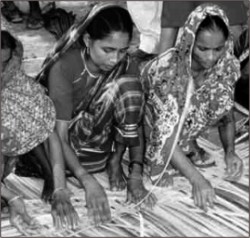Rights Investigation
Working women in the informal sector: Condition in the era of globalisation
Rapid expansion of informal sector has emerged to contribute a greater part of national economy, which needs to be identified to measure the present scenario, growth trend and above all to identify problems of different sectors. The inability of the formal economy to generate employment is further aggravated due to the changes in the concept of employability and the organization of work, which is characterized by labour market flexibilisation including non-standard forms of employment and shorter product cycles.
Consequently the vast majority of unemployed people are engaged in various types of informal activities such as agriculture, shrimp cultivation and processing, construction works, brick field works, domestic works, rag picking, handicrafts, stitching, tant (handloom), work in bidi factories, tailoring, silk and zamdani shari production oriented work, block printing works, fish processing and drying etc. Nevertheless, there is no policy guideline about the development and regulation of this sector in national development policy.
Globalisation and labour
 The process of globalisation has a robust correlation with means, objects and process of labour. The current phase of globalisation is characterised by the internationalising of production and the new international division of labour.
The process of globalisation has a robust correlation with means, objects and process of labour. The current phase of globalisation is characterised by the internationalising of production and the new international division of labour.
Although scholars vary widely in terms of how they conceptualise globalisation and what they see to be its novel features, there is some consensus that globalisation is simultaneously an economic, cultural, and political phenomenon that includes the integration of world markets through increasing trade and capital mobility, the rapid diffusion of ideas and norms trans-nationally, and the restructuring of power relationships and political interests.
Globalisation is viewed primarily as an economic phenomenon, involving the increasing interaction, or integration, of national economic systems through the growth in international trade, investment and capital flows. But one can also point to a rapid increase in cross-border social, cultural and technological exchange as part of the phenomenon of globalisation.
Globalisation and Female Workers
The impact of economic globalisation on women needs to be assessed in light of women's multiple roles as productive and reproductive labour in their families, as well as their contributions towards overall cohesion and welfare of community, and maintenance of the social fabric. Because of deep-rooted differences in gender roles and socio-cultural expectations, the impacts of economic globalisation are felt quite differently by women and men. While economic class, race and culture are also extremely important factors in determining the nature and extent of impacts, by and large, the very same policies and trends are likely to have quite different implications for women and men.
The current phase of globalisation is associated with changes in the economic policies, packages as structural adjustment and was adhered to by the governments of developing countries, under dictate of the different International Organisation. A series of studies shows that adjustment policies affected women much more deeply than men did to their male counterpart. For example, the elimination of public subsidies for health, education and other social services resulted in transference of the "welfare" function of the state onto families, and by extension onto girls and women. This trend became entrenched as governments continued to cut back on social spending, thus increasing the burden of caring for vulnerable community members (such as children, the aging, disabled persons or those with illness) on families. Because of women's traditional roles in most societies as caregivers, this burden has been disproportionately borne by women than men (Guttal, 2000
The ILO has published a report entitled Economic security for a better world for the first time to measure social and economic security of individuals and countries around the world. An Economic Security Index (ESI) has been calculated for over 90 countries (covering 86% of the world's population). The report shows that economic security promotes economic growth and social stability.
Economic security is composed of basic social security, defined by access to basic needs infrastructure pertaining to health, education, dwelling, information and social protection, as well as work related security. The report delineates seven component of work-related security. While all seven dimensions are important, two are essential for basic security: income security and voice representation security. Basic security means limiting the impact of uncertainties and risks people face daily while providing an environment in which people can belong to a range of communities, have a fair opportunities to pursue a chosen occupation and develop their capacities via what the ILO calls decent work. Hence it is essential to understand situation of different workers involved in informal sector, particularly the women. At the same time identify the actual need of workers and to o develop guidelines for providing legal support to the informal sectors workers.
Source: Karmojibi Nari, an initiative for working women in Bangladesh.